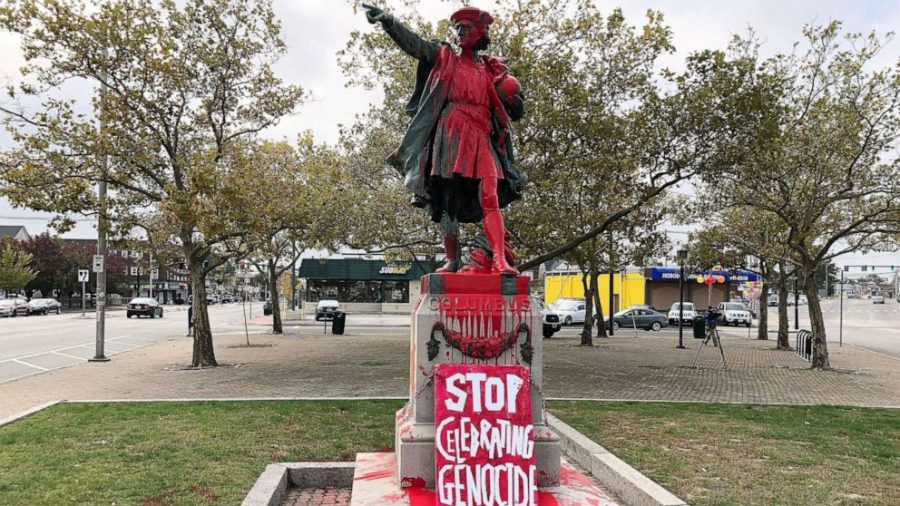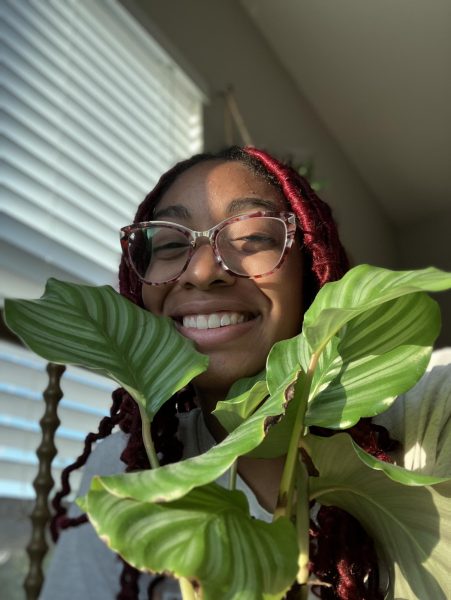Reconsidering Columbus Day and the Importance of Recognizing Indigenous People
Photo courtesy of Michelle R. Smith/AP
A defaced statue of Christopher Columbus splashed with red paint and a sign placed at the foot that reads “stop celebrating genocide” in Rhode Island. The statue was vandalized on Columbus Day in 2019. Columbus Day has been the subject of controversy for decades since it was made a federal holiday in 1937 by Franklin D. Roosevelt.
October 9, 2022
We’ve all heard the phrase: “In 1492, Columbus sailed the ocean blue,” but hardly do we hear about the diverse groups of Indigenous people that were the real foundation of the United States. Columbus has often been credited as the one who ‘discovered’ America when in actuality, he brought upon these violence, disease and colonization to many Indigenous groups throughout America. This history of genocide and call for change has caused many to reconsider the recognition given to Columbus through the national holiday, Columbus Day.
Columbus Day takes place on October 10th and has been the subject of controversy for decades since it was made a federal holiday in 1937 by Franklin D. Roosevelt. Controversy surrounding the holiday dates back to the 19th century when anti-immigrant groups protested Columbus Day because of its Catholic association. In recent decades, Indigenous groups have protested the recognition of Columbus Day due to the real nature of Columbus’ “discovery”.
So, should Columbus Day be celebrated? Many people are just happy to have a day off, but they’re missing the implications of continuing Columbus Day. The truth is that when we continue to celebrate Columbus Day, we honor someone who caused mass genocide. It’s not a stretch to say many feel that celebrating a man who caused the deaths of millions and centuries-long oppression of an entire ethnicity of people, is morally wrong.
So instead of celebrating Columbus Day, we should be celebrating Indigenous People’s Day. This would honor Indigenous people, their resilience, and their contributions to American society throughout history through a day of remembrance.
But even if Indigenous People’s Day is made a federal holiday, that doesn’t make up for the violent oppression of Indigenous people that is felt throughout the community even now. For example, there is still a massive epidemic of missing and murdered Indigenous women in North America that is overlooked by law enforcement and lawmakers. This ignorance has let more women die, leaving their families with no answers.
According to a study from the Urban Indian Health Institute, as of 2016, the National Crime Information Center has reported 5,712 cases of missing American Indian and Alaska Native women and girls, but the U.S Department of Justice’s missing persons database has only reported 116 cases. The same study found that murder is the third leading cause of death among Indigenous women. This merely emphasizes the need of having higher recognition of Indigenous people throughout the United States.
There also needs to be more education about Indigenous people, history, and culture in schools. American history doesn’t and shouldn’t start with Columbus’s voyage. People lived here long before he had ever sailed. When teaching students that Columbus is the foundation of American history, we continue to implement a narrative that white people are the center of history and the only perspective that matters. This simply ignores the centuries of oppression that has been created by European colonization.
Let’s be clear. The implementation of Indigenous People’s Day as a federal holiday should not be the only thing that the United States does to represent Indigenous people. Celebrating Indigenous People’s Day instead of Columbus day should not be an act of pity. It should not be something performative for lawmakers to pat themselves on the back and go home thinking they did something substantial. It should not be done half-heartedly, as a way to say “we did it, you can stop complaining now.”
Replacing Columbus Day with Indigenous People’s Day is not where the change needs to stop, we need to continue to work on destigmatizing the stereotypes that continue to be pushed onto Indigenous groups. Indigenous groups don’t deserve to be pushed aside in celebration of the same man who brought upon their violent colonization. It’s time to change.




